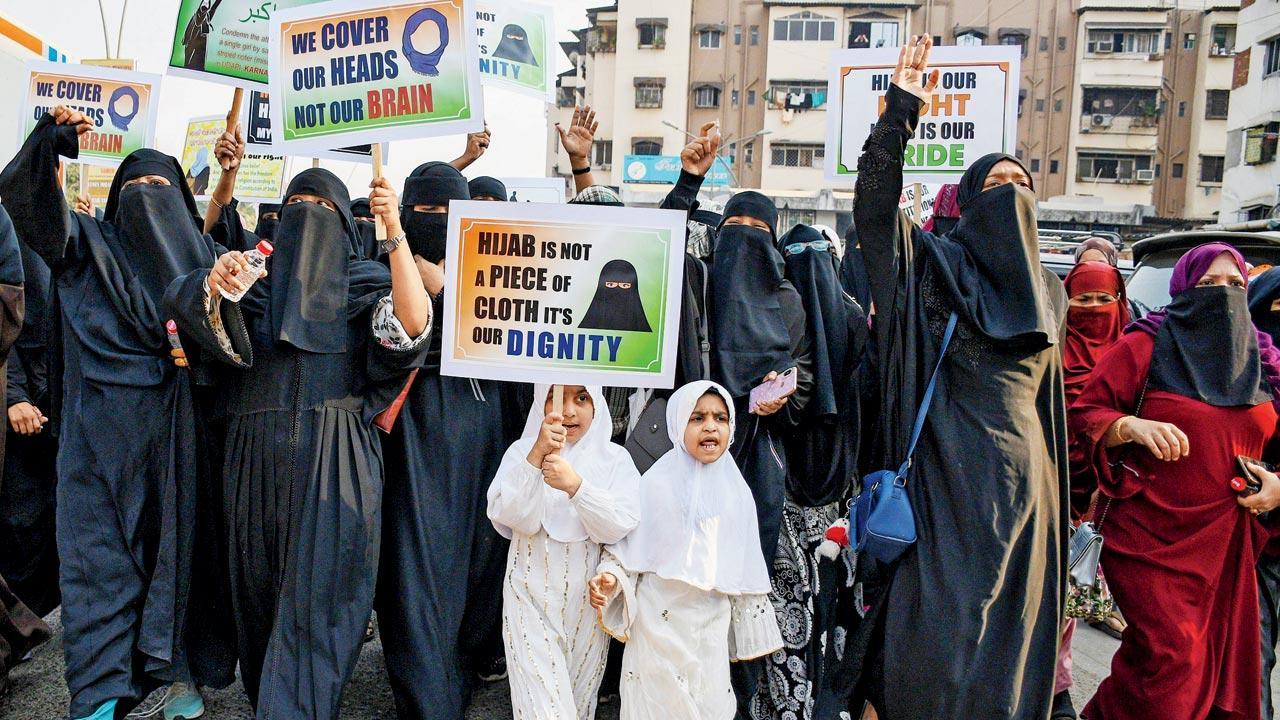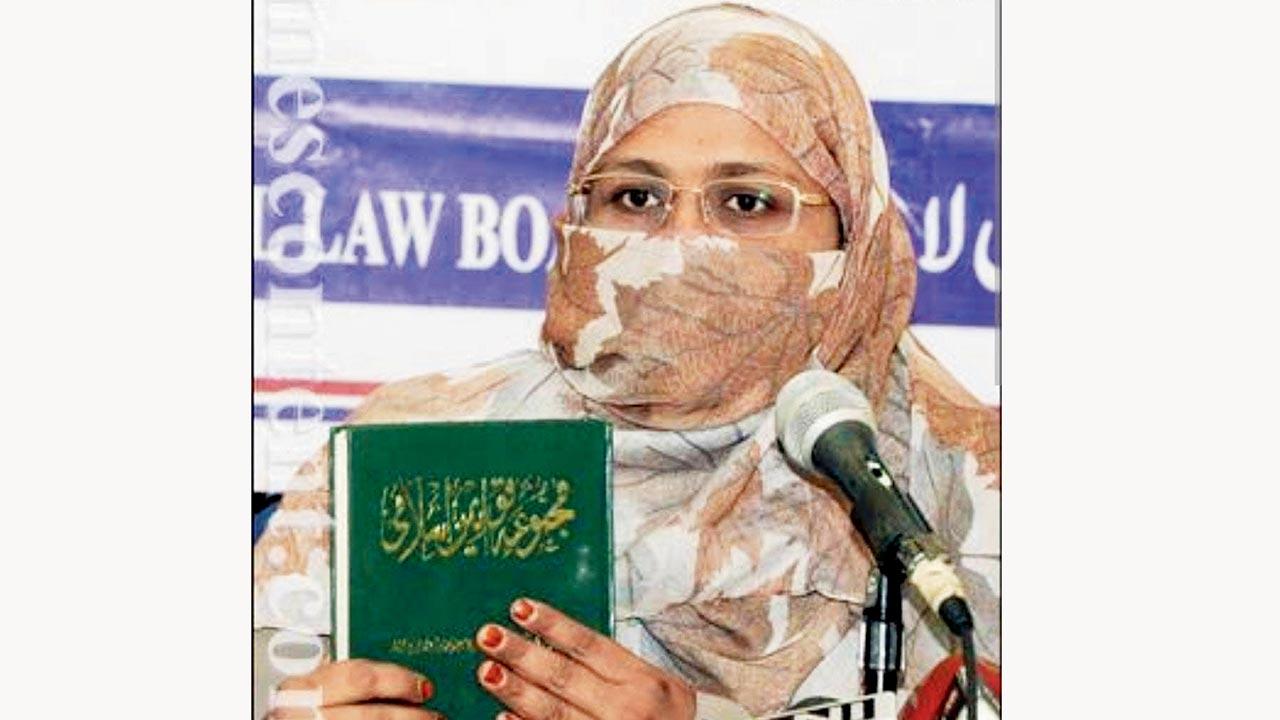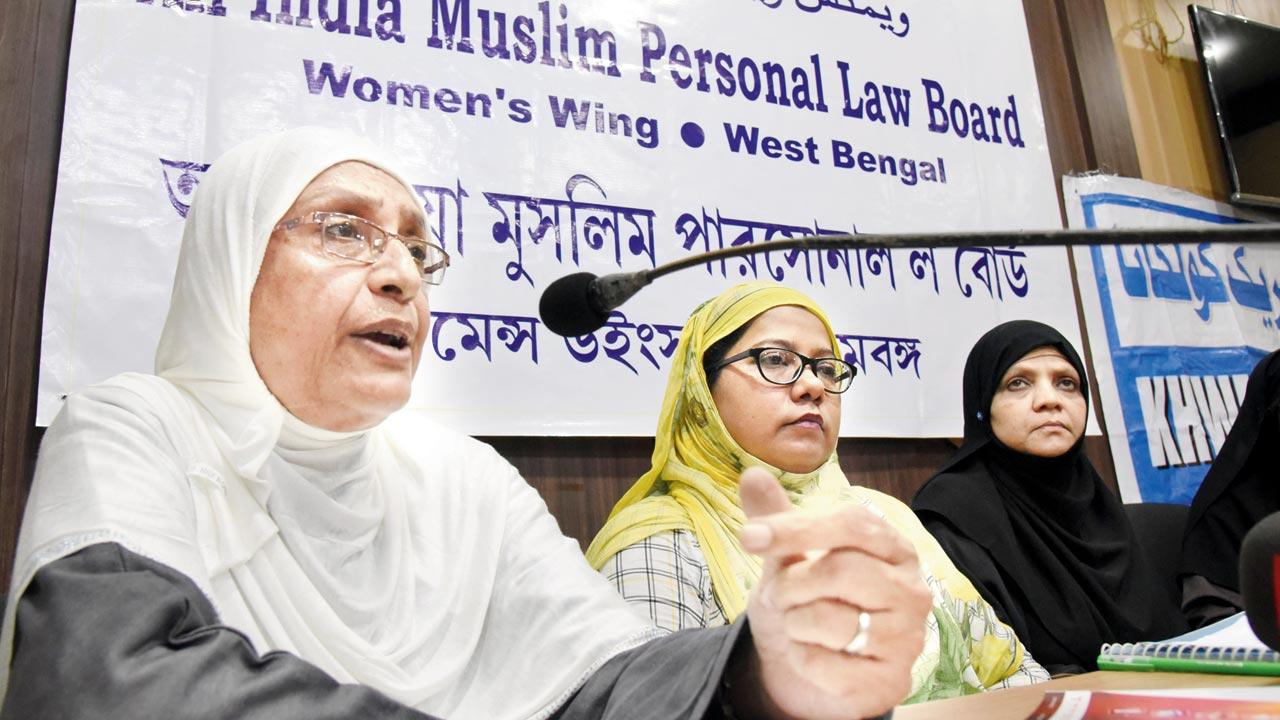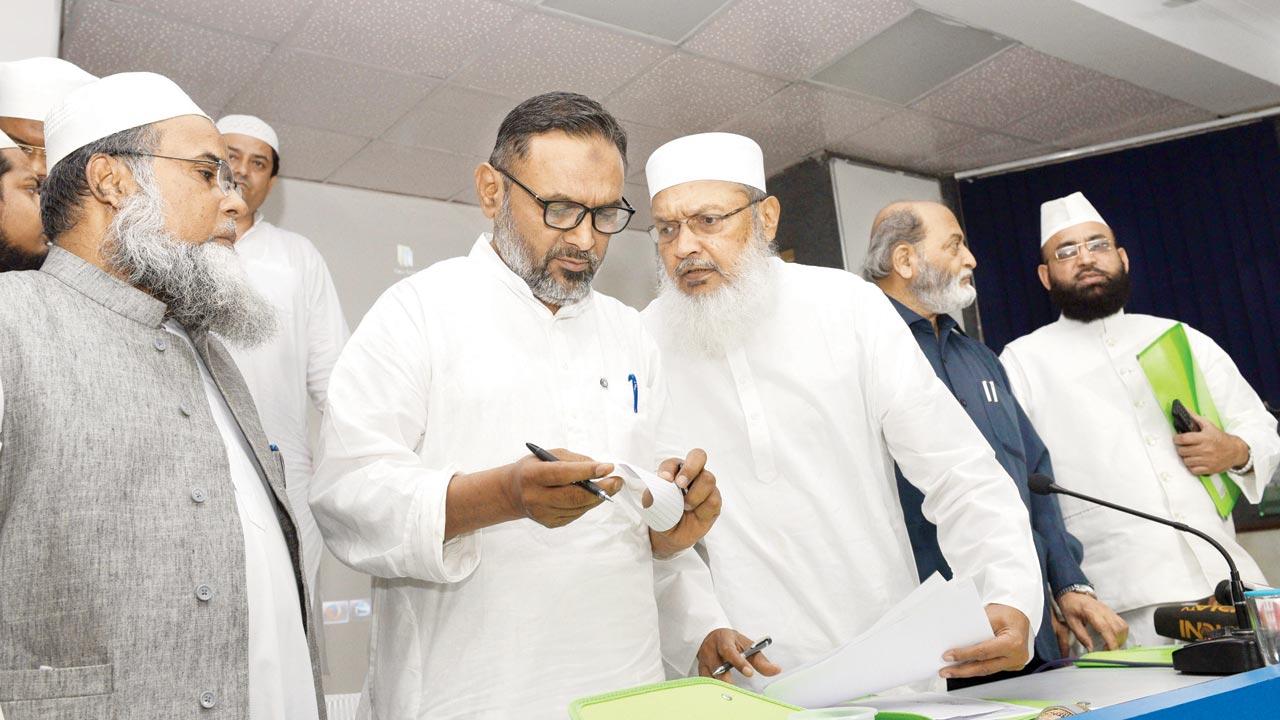Was the women’s wing of the All India Muslim Personal Law Board going beyond its brief, and into activist mode that became a bone of contention for office bearers who decided to put it on pause mode? mid-day deep dives into the controversy that has put a question mark on the Board’s willingness to pursue women’s issues

Women lead a protest against Karnataka government’s uniform policy that disallowed wearing of hijab by Muslim students, in Mumbra. Pics/ Getty images
Earlier this year, a school in Udupi, Karnataka, stopped students wearing the hijab from attending school, citing a reform in its uniform policy. In a flash, the then convener of the women’s wing of the All India Muslim Personal Law Board (AIMPLB), Dr Asma Zehra, was flooded with appeals from Muslim women.
The Hyderabad resident who thought it right to rise to the call for action, took up the matter with AIMPLB office bearers and working committee members in March. Dissatisfied by their decision to settle the matter peacefully and out-of-court, she decided to make “personal efforts” by becoming a party in the court case.
On October 11, the practising physician got a letter from AIMPLB’s general secretary, Maulana Khalid Saifullah Rahmani, telling her to halt all activities by the women’s wing. The letter also asked for all their social media accounts to be deleted.
 Dr Asma Zehra, member of All India Muslim Personal Law Board and former convener of its women’s wing
Dr Asma Zehra, member of All India Muslim Personal Law Board and former convener of its women’s wing
“I had a job to perform—to listen to the women at the grassroots level, who were bearing the pain of this policy. But I was not allowed to perform my task,” Dr Zehra tells mid-day over a phone call. “The Karnataka issue was in the headlines. Girls were in the eye of the storm. I was being questioned about AIMPLB’s silence when it had come out all guns blazing for the instant triple talaq ban. I had requested a working committee meeting, which happened in March, but nothing came out of it.”
Dr Zehra then took up the matter as an individual. “Through my other organisation Shariah Committee, I filed a Special Leave Petition in the Supreme Court on the hijab row and addressed the media as President of the Shariah Committee.” The Hyderabad-based body is a not-for-profit organisation formed in 1966-67; it works towards safekeeping of the Muslim Personal Law and religious rights under the Constitution. Two of its members are part of AIMPLB, but the Committee itself has no connection with it.
Suspending the activities of the women’s wing sends the message, says Dr Zehra, that “women are not needed anymore”. “I was under tremendous pressure from the women of my community; the leadership had failed to live up to their expectations.” Dr Zehra has tendered her resignation from the working committee, but intends to remain part of the general body. AIMPLB is yet to respond to her resignation.
 Qasim Rasool Ilyas (Second from left) with the current General Secretary of AIMPLB, Maulana Saifullah Rahmani, in 2018
Qasim Rasool Ilyas (Second from left) with the current General Secretary of AIMPLB, Maulana Saifullah Rahmani, in 2018
The Board says this is an “internal matter”. Executive committee member Qasim Rasool Ilyas says AIMPLB decided at the meeting in March to take a different route to resolve the hijab issue peacefully, and out of court. “We did not want the matter to reach court,” says Ilyas, “We were talking to the school management and the administration, and an agreement was being reached. This is why the women’s wing was asked to be patient and let things work themselves out. But they didn’t pay heed. The Popular Front of India (PFI) and other organisations fuelled passions, and the matter got blown out of proportion. It reached the courts and gave political mileage to some parties.”
He refutes the accusation that the Board does not care for the rights of women, saying the women’s wing was formed to increase their participation in all of the Board’s committees, aspects and decision making. “But they had no rules and guidelines,” says Ilyas. “In the March meeting, a five-member committee was set up to form the missing guidelines as the women’s wing held activities beyond the scope of AIMPLB such as tailoring and cooking classes, giving out scholarships, etc. Our committee recommended that all activities be suspended until the guidelines were in place.” He stresses that the wing has not been disbanded and will be re-formed. Ilyas headed the committee formed in March, which had three male and two female members.
“Many large Muslim organisations that are part of AIMPLB and work in the fields of education and community service, have questioned the involvement of the women’s wing in these fields, as it is outside their original purview of work,” Ilyas tells mid-day.
 Members of All India Muslim Personal Law Board’s West Bengal women’s wing at a presser in 2018
Members of All India Muslim Personal Law Board’s West Bengal women’s wing at a presser in 2018
However, Dr Zehra says the tailoring and Ramzan cooking competitions were held during the pandemic when community engagement was held by a thread. “We just wanted to keep the women engaged in fruitful activity,” says Dr Zehra, “and these were stopped after social movement resumed. But AIMPLB claimed we were trespassing beyond the brief of work.”
Dr Zehra is a long-standing member of AIMPLB. She joined in 2006 and by 2010, she was elevated to the working committee. In 2015, when the women’s wing was formed, she was made convener. She has yet to delete the wing’s social media accounts, and said will do so gradually.
“Until the death of former general secretary, Maulana Wali Rahmani, in 2021, the women’s wing had rights and a voice,” says Dr Zehra, “The change of guard is not a problem, but I can read between the lines. The wing is being put on pause mode abruptly due to pressure. It could have been done in a better fashion and
more gradually.”
Ilyas calls Dr Zehra’s allegations unsubstantiated. “She has made tall claims about right-wing members being present in AIMPLB, but doesn’t have any proof,” he says. “She says women are not being heard, when in fact, AIMPLB wants more representation in all its committees and on the Board as a whole. She should not have washed the Board’s dirty internal linen in public.”
Where are the women in AIMPLB?
The All India Muslim Personal Law Board is an independent umbrella body of Muslims in the country, boasting of the largest representation from the community. It primarily works towards religious and constitutional rights of Muslims through legal, social and religious awareness. With around 51 members in its working committee (WC), out of which only five are women, it has less than 10 per cent representation of women in its WC; in its general body of 251 members, women’s representation is at 11 per cent with 29-30 female members. The women’s wing was formed in December 2015 as an outreach body for their issues and has teams in various districts, plus over 150 foot soldiers.
 Subscribe today by clicking the link and stay updated with the latest news!" Click here!
Subscribe today by clicking the link and stay updated with the latest news!" Click here!










